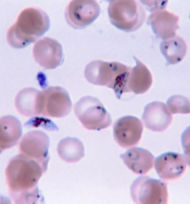Malaria: Cause, Symptoms and Treatment
 This disease is a parasitic infection of the liver and red blood cells. The disease is transmitted by female mosquitoes of the genus Anopheles. When the mosquito bites, the parasites enter a person's body, invading red blood cells and causing the cells to rupture. As the cells burst, they release chemicals that cause malaria's symptoms.
This disease is a parasitic infection of the liver and red blood cells. The disease is transmitted by female mosquitoes of the genus Anopheles. When the mosquito bites, the parasites enter a person's body, invading red blood cells and causing the cells to rupture. As the cells burst, they release chemicals that cause malaria's symptoms.
Symptoms
Malaria causes a flu-like illness and these would include
- fever
- rigors
- headaches
- sweating
- tiredness
- myalgia (limbs and back)
- abdominal pain
- diarrhea
- loss of appetite
- orthostatic hypotension
- nausea
- slight jaundice
- cough
- enlarged liver and spleen (sometimes not palpable)
- vomiting
Symptoms of malaria infection are not always dramatic, and can easily be dismissed as unimportant. Should the infection not be attended to deterioration is normally sudden and drastic as the parasites rapidly increase in the blood stream. In its severest forms malaria can cause seizures, coma, fluid buildup in the lungs, kidney failure, and death.
About 350 million to 500 million cases of malaria occur worldwide every year. About one million are fatal, with children in sub-Saharan Africa accounting for most of the deaths. Other high-risk areas include Central and South America, India, and the Middle East.
It is possible, but not very general, to develop a relapsing type of malaria months for even years after being infected by malaria — even if anti-malarial drugs were taken.
Treatment
Malaria is treated with a variety of drugs, some of which kill the parasites once they're in the blood and others that prevent infection in the first place. Of course, if you can avoid the parasite-carrying mosquitoes, you can avoid malaria, so the disease is often controlled using mosquito repellent and bed netting, especially in poor countries that cannot afford medications.
|